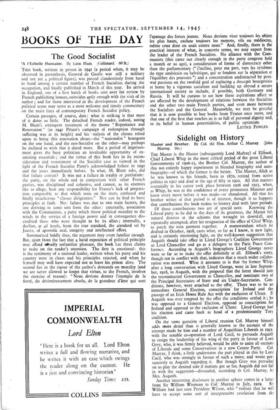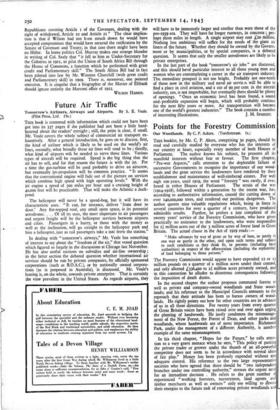Sidelight on History
THE Master is the Master (subsequently Lord Mufray) of Eldiank, Chief Liberal Whip in the most critical period of the great Liberal Governments of 1906-15, the Brother Col. Murray, the author of this not entirely happy experiment in blended biography and auto- biography—of which the former is the better. The Master, Alick as he was known to his friends, born in 1870, retired from active politics in 1912 and died at the age of fifty in 1920. All that matters essentially in his career took place between 1906 and 1912, when, as Whip, he was in the confidence of every prominent Minister and knew every move before it was made—or abandoned. All that his brother writes of that period is of interest, though it so happens that contributions the book makes to history deal with later periods.
Of these contributions two are of special note. Knowing the Liberal party as he did in the days of its greamess, the Master felt natural distress at the schisms that wrought its downfall, and repeatedly attempted, after his resignation of the office of Chief Whip, to patch the torn garment together. A memorandum which he drafted in October, 1918, casts what, so far as I know, is new light, and is certainly interesting light, on the well-known suggestion that Asquith should take office in Lloyd George's Coalition Government as Lord Chancellor and go as a delegate to the Paris Peace Con- ference. According to Asquith's biographers Lloyd George never went so far as to make the offer definitely at all. Elibank's story, though not in conflict with that, indicates that a much wider collabo- ration was mooted. What it amounts to is that rhe former Whip, after a long conversation with Lloyd George, went in late Septem- ber, 1918, to Asquith, with the proposal that the latter should join the reconstructed Government as Chancellor, and nominate two of the Principal Secretaries of State and six Under-Secretaries. Con- ditions, however, were attached to the offer. There was to be an immediate General Election, conscription for Ireland and the passage of an Irish Home Rule Act with the exclusion of Ulster. If Asquith was ever tempted by the offer the conditions settled it ; he was opposed to a General Election, opposed to conscription for Ireland and opposed to the exclusion of Ulster. Lloyd George had his election and came back as head of a predominantly Tory coalition.
On the same question of Liberal reunion Col. Murray himself adds more detail than is generally known to the account of tin attempt made by him and a number of Asquithian Liberals in 1921, with the notable co-operation of Lord Cecil, to persuade Asquith to resign the leadership of his wing of the party in favour of Lord Grey, who, it was firmly believed, would be able to unite all sections of Liberals and some Conservatives in a new Centre Party. Col. Murray, I think, a little understates the part played in this by Lord Cecil, who was strongly in favour of such a move, and wrote per- suasively to Asquith regarding it. But though Grey was prevailed on to play the desired role if matters got so far, Asquith did not fall in with the suggestion—dissuaded, according tb Col. Murray, b • Mrs. Asquith.
Another interesting disclosure in another sphere comes in a lette from Sir William Wiseman to Col: Murray in July, 1919. Si
William had just seen President Wilson, who "realises that he wil have to accept some sort of interpretative resolution from th
Republicans covering Article x of the Covenant, dealing with the right of withdrawal, Article so and Article 21." The clear implica- tion is that if Wilson had not been struck down he would have accepted compromises that would have secured the ratification by the Senate of Covenant and Treaty; in that case there might have been no Hitler. In home politics Col. Murray makes one strange blunder in writing of Col. Seely that "it fell to him as Under-Secretary for the Colonies in 1911, to pilot the Union of South Africa Bill through the House of Commons, a function which he performed with great credit and Parliamentary skill." The South Africa Bill had in fact been piloted into law by Mr. Winston Churchill (with great credit and Parliamentary skill) in 1909. There is, moreover, one pointed omission. It is singular that a biographer of the Master of Elibank should ignore entirely the Marconi affair of 1912.
WILSON HARRIS.



























 Previous page
Previous page